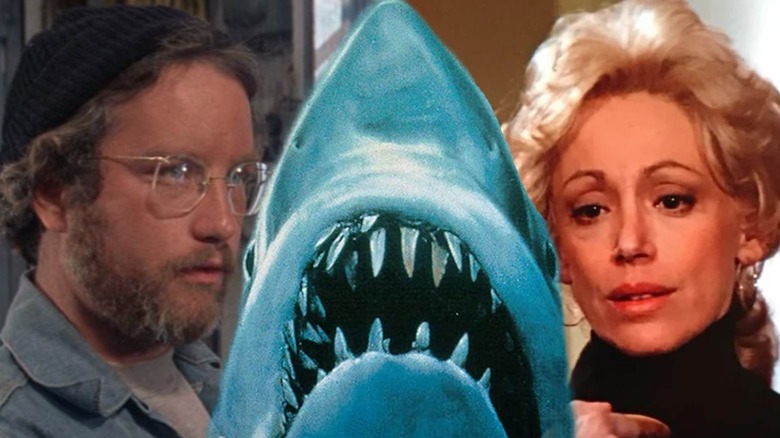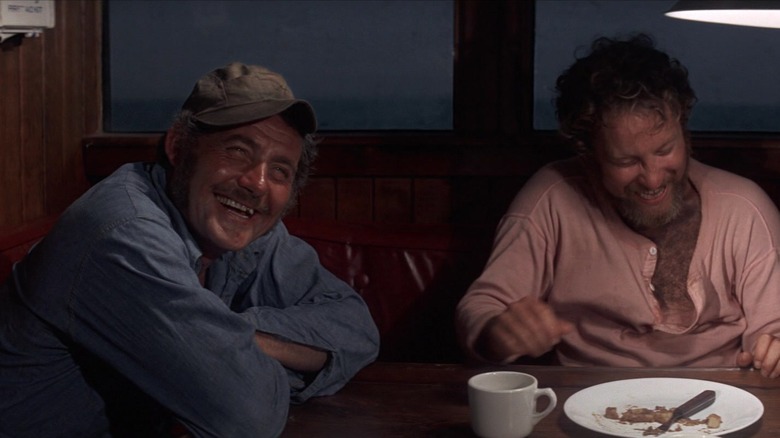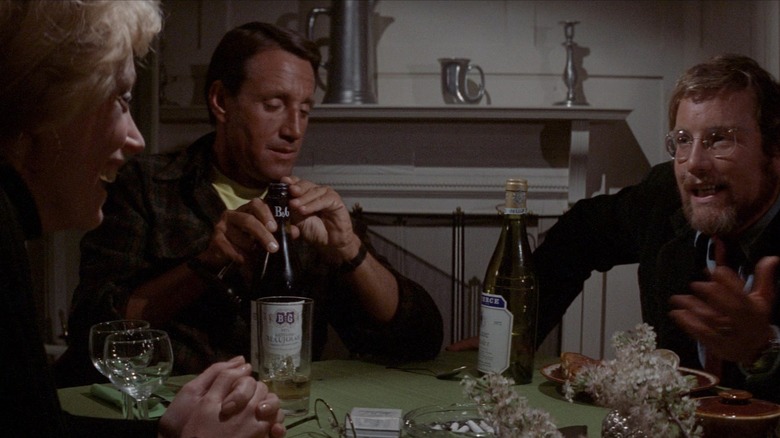Steven Spielberg's Jaws Rightfully Left Out The Worst Part Of The Original Novel
Looking back on its 50th anniversary, it's hard to imagine slipping anything extra into "Jaws." To even suggest adding anything to Steven Spielberg's perfect film (not to mention, one of the best movies ever made) would be like nails on a chalkboard. And yet, there is one significant subplot from Peter Benchley's original book, on which the film is based, that Spielberg quite rightfully omitted. In addition to the battle between the film's three leads and a human-eating machine, Benchley's novel contained something far more scandalous and sordid — something that's never even hinted at in the movie version. It's a threat that creeps right up the beaches of Amity Island and onto Chief Brody's (Roy Scheider in Spielberg's film) doorstep: a romantic affair between his wife and the educated outsider Hooper (Richard Dreyfuss).
Initially, in Benchley's version of the story, the stark social divide between Brody and the beach-based business owners of Amity contrasts sharply with his simple interactions with his wife Ellen (Lorraine Gary). At the same time, Ellen emerges as a more developed character who's grappling with her own challenges. Trapped on the island and longing for a life beyond its shores, Ellen is instantly drawn to Hooper, a young, spirited ichthyologist and the brother of a man she dated before meeting her husband. Eventually, the pair even have a secret rendezvous, which goes on to play a crucial part in the rest of the narrative. By the end, however, both of Brody's problems are lost to the sea when the chief emerges as the sole survivor in the final showdown between humanity and shark-kind.
Hooper and Quint both die in the original Jaws novel
Back in 1975, fans of Benchley's novel might have already been thrown for an inflatable loop when the affair that was such a core part of the original story was nowhere to be found in Spielberg's film adaptation. The surprises would've then continued when the book's ending, which couldn't have been more different from Spielberg's version, didn't make the cut, seeing as Brody isn't alone when he swims back to shore.
Benchley, in all his writing wisdom, killed off Hooper when he took his daring dip in the anti-shark cage. Rather than narrowly escaping the jaws of death like he does in Spielberg's film, he gets caught in their grip and dies a bloody death similar to Quint's (Robert Shaw) in the movie version of "Jaws." As for the worn-down fisherman, Quint makes a less grizzly exit in Benchley's book when, after striking the titular fish with a harpoon, he accidentally gets his foot caught in the rope it's attached to and is dragged down to the depths by the very thing he's been obsessed with killing.
Ultimately, Brody alone returns from the sinking of the Orca in Benchley's source material. It's a far simpler ending, but one that wouldn't have worked in the film that Spielberg ended up making. Not only does it lack the bombast and bloody terror the director was clearly aiming for, but Spielberg's movie is also populated by characters who are much more endearing than their counterparts on the printed page. That includes Hooper, who, thanks to Dreyfuss' performance (combined with some rewrites), proves to be a considerably kinder man in "Jaws" the film.
Hooper survives in the film version of Jaws because Spielberg made him a nice dude
While it plausible Hooper would've still ended up sleeping with the fishes in Spielberg's movie if it hadn't been for a happy accident during the filming of the cage scene, it also helped that Hooper was an otherwise good and well-intended person in the film. Benchley's version of the character, by comparison, turns out to be a homewrecker who eventually finds himself at odds with Brody after the latter, quite easily, deduces what's been happening behind his back. This makes Hooper's death in the book more of a punishment and one that's perhaps fitting for the path he's chosen to take.
Dreyfuss' double-denim-wearing academic, on the other hand, is just as invested and sincere about stopping the eponymous great white shark as Brody is. His sole interaction with Ellen in Spielberg's film (when Hooper sorta crashes the Brody family's somber dinner after the shark claims its second victim) is similarly charming and harmless. Having him perish the way he does in the book would've simply felt unnecessarily morbid and grim.
Above all else, though, Spielberg clearly wanted to give Brody something to fight for, and that includes the Brody family, which is clearly a loving one and far from the broken unit depicted in Benchley's novel. Indeed, the glimpses we get of Brody interacting with his young sons ("Give us a kiss") and his wife prove that there's a whole lot of affection between them. To have included the Ellen-Hooper affair would've given rise to a very different story — one that wouldn't have been nearly as satisfying as the one we got instead.


